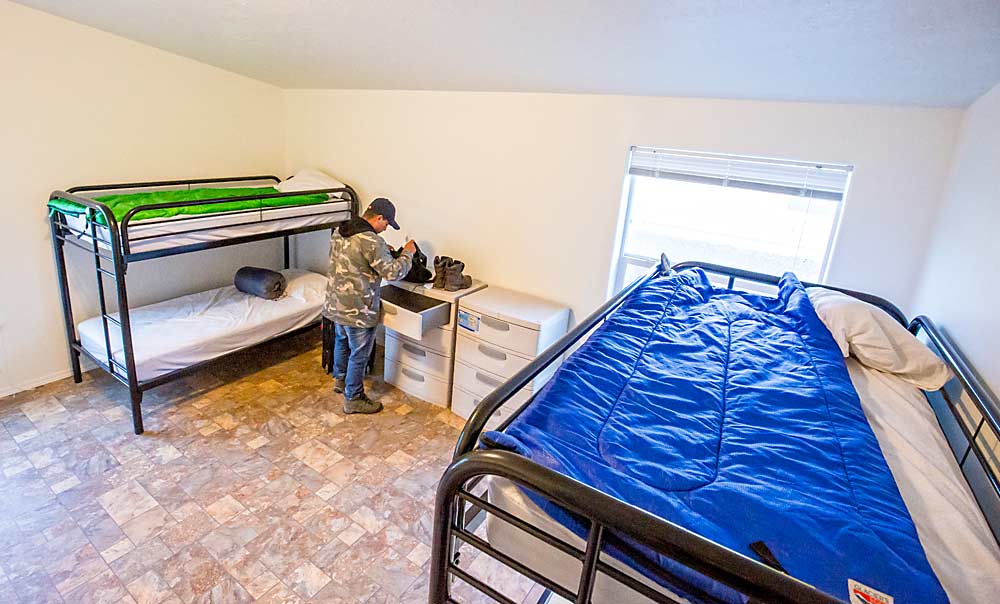
Social distancing may be easy to maintain in the orchard during the day, but off-hours can get close and personal, even in the wide open spaces of U.S. agriculture.
In the tree fruit industry, growers started the season preparing their worker housing units for life under the shadow of the coronavirus, spacing out beds as best they could, staging health screenings and writing sanitation protocols.
“It is certainly challenging, that’s for sure,” said Dan Keller, orchard manager for Gilbert Orchards in Yakima, Washington. “There’s new questions that people ask every day that we have to research.”
The threat is real. In early April, 14 temporary foreign workers at a British Columbia, Canada, nursery tested positive for the coronavirus. All of them lived in on-site housing.
Early in the outbreak, advice shifted rapidly as we learned more about the virus. Growers associations and health authorities drafted some guidelines, though even by mid-April some of the details were in flux. Not surprisingly, the suggestions included setting up housing to encourage frequent hand-washing and sanitizing surfaces, along with maintaining the recommended 6-foot distance between people. Some advised booking hotel rooms to help isolate infected workers.
“I know these are hard asks, but we all have a responsibility,” said Amy K. Liebman, director of environmental and occupational health for the Migrant Clinicians Network, an Austin, Texas, farmworker advocacy nonprofit, in a webinar in March.
Washington
In Washington, at the request of industry groups, the state Department of Health issued a list of recommendations for temporary worker housing facilities. Among them are placing bunk beds 6 feet apart, conducting health checks and posting educational materials in Spanish and English.Normally, the state health department requires bunk beds spaced 4 feet apart and single beds 3 feet apart to reduce the spread of communicable diseases.
The recommendations started as only guidelines. However, at the urging of farmworker advocacy groups, the state attempted to give them some teeth in early April. Washington’s Department of Labor and Industries, the state’s workplace safety enforcement agency, deemed the coronavirus a known hazard and required employers to address it in their plans and policies, including for temporary agricultural workforce housing. In an enforcement memo, Labor and Industries often used the word “must,” while still leaving a gray area to acknowledge the limited space at housing facilities. “Employers must provide them with accommodations that are separate from others — a separate building or room if available, or use barriers or distance to separate them from others,” it read.
The Washington Growers League, a farm labor assistance nonprofit in Yakima, operates three of its own farmworker housing facilities. Staff spent March and April installing stations for hand sanitizer and disinfectant wipes, as the items were available through suppliers. The units typically don’t hit their peak occupancy until June and July, so managers in May are setting aside currently empty rooms for possible quarantine lodging and spacing out residents two or three to a room, said Mike Gempler, executive director. Once cherry harvest hits its zenith, they will have to go back to the usual four people per room, he said. In mid-April, the Growers League proposed to the state the use of panels, sheets or curtains to enclose bunks.
Perfection is impossible, Gempler said, but he encouraged growers to do the best they could and stay persistent with cleaning and education. He also reminded them to be sensitive to their workers’ concerns. They’re probably scared, too, he said.
“We need to have the confidence of our workforce,” he said.
Wafla, another Washington-based grower organization focused on labor, also scrambled in the early spring weeks to equip its housing facilities with disinfectant and cleaning supplies. The group dispatched staff to growers, to help explain to workers the seriousness of social distancing and Gov. Jay Inslee’s “Stay Home, Stay Healthy” order.
“It’s the law,” said Dan Fazio, executive director.
Wafla has experience with communicable diseases in a dormitory-style orchard labor camp. In April last year, four workers at a housing unit owned by a wafla member in Mattawa came down with mumps. With the help of the Grant County Health District, the farm owner isolated the sick workers in one unit and the exposed workers in other units and quickly vaccinated the entire work crew. It was unclear where the workers contracted mumps, but wafla required measles-mumps-rubella vaccinations before bringing H-2A workers to Washington in 2020.
“This is not our first rodeo,” Fazio said.
Not just housing
Other groups advise growers to help their employees maintain social distance during transportation to job sites and errands in town. For example, Liebman, of the Migrant Clinician’s Network, recommended busing workers in multiple trips to reduce density inside vehicles.
Lee Wicker of the North Carolina Growers Association suggested in a March webinar helping workers order groceries online and recruiting one or two of them to pick them up. With 9,000 workers under contract for roughly 650 members, the association is the largest H-2A user in the U.S.
As the pandemic accelerated, the federal Department of Homeland Security labeled farming critical infrastructure. Most tree fruit-producing states followed suit by allowing agricultural work to continue during shelter-in-place mandates. But don’t take that for granted, Jon DeVaney, president of the Washington State Tree Fruit Association in Yakima, said in an email to growers. The association indirectly heard complaints about groups of farmworkers causing “alarm and resentment” at grocery stores and banks in Washington communities for not following social distancing guidelines.
“We strongly encourage all employers to brief new seasonal employees on these social distancing requirements and to take steps to ensure compliance, particularly when they are on employer-facilitated trips into town to access essential services,” DeVaney wrote. “Voluntary compliance by all members of our industry will help ensure that government does not decide that more onerous mandatory measures are required.”
—by Ross Courtney
Related:
—Oregon issues pandemic farming rules
—Mumps hits farmworkers






Leave A Comment